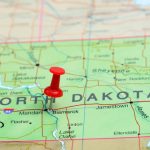The traditionally red Roughrider State is now in line to become the 10th state to legalize marijuana for recreational use.
America’s green rush is heading north. Last month, cannabis advocates in North Dakota presented state regulators with more than 18,000 signatures calling for an end to marijuana prohibition. This week, the North Dakota Secretary of State’s office confirmed those petitions, securing the adult-use legalization question on November’s upcoming midterm ballot.
According to a report from Forbes, Roughrider State officials confirmed that more than 15,000 of the presented signatures were valid, well over the 13,452 mark necessary to qualify as a statewide ballot initiative.
“It’s great to see three to four years of hard work finally pay off, and to get people what they really want and what they deserve, because the people of North Dakota deserve this,” Dave Owen, chairperson of the legalization project, told the Bismarck Tribune in July after petitions were officially turned in. “Our bill is a good bill. It’s a bill that’s workable from day one, it makes sense, it’s going to create massive [agricultural] revenue… I’m just excited. I’m at a loss for words.”
As it is currently structured, North Dakota’s legalization bill would allow adults 21 and older to possess and grow as much cannabis as they would like, with no institutionally-imposed limits. In addition to unprecedented personal freedoms, the ballot measure would facilitate the implementation of a comprehensive distribution chain and retail sales program for legal weed.
“Marijuana legalization is no longer a regional or partisan issue,” NORML Executive Director Erik Altieri told Forbes. “Well over 60% of all Americans support ending our nation’s failed prohibition and I expect North Dakota voters to send shockwaves across the country this fall when they join the growing contingent of states who have chosen the sensible path of legalization and regulation over prohibition and incarceration.”
Since North Dakota’s ballot measure is significantly less restrictive than similar laws in the rest of the legal weed landscape, it’s possible that, if approved, the state’s Republican leadership could take notes from lawmakers in places like Massachusetts and Maine, where state legislators reshaped and delayed legalization initiatives after they were passed by voters.
In 2016, more than 60% of North Dakotans cast their vote to legalize medical marijuana, but after two years of waiting, state regulators are still sorting through dispensary applications. Currently, the North Dakota Department of Health plans to implement legal medical sales sometime in 2019.
(70)





Leave A Reply